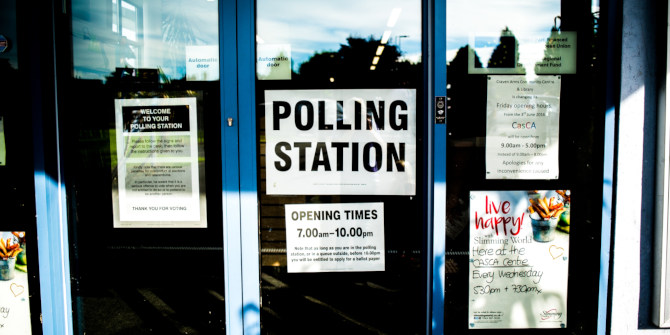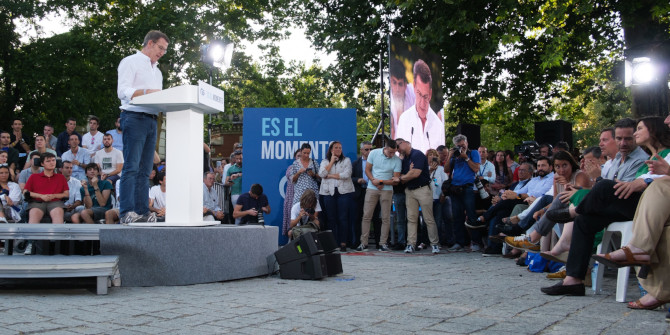What will Alexander Stubb’s election as President of Finland mean for the country’s foreign policy? Matti Pesu writes that while there is unlikely to be a sharp change in relation to key foreign policy issues, Stubb’s style of doing politics may be notably different to his predecessor, Sauli Niinistö.
Alexander Stubb will assume office as the new President of Finland on 1 March, following his victory over Pekka Haavisto in the second round of the Finnish presidential election. In doing so, he will succeed outgoing Sauli Niinistö, who has been exceptionally popular among Finns during the 12 years of his reign.
President-elect Stubb ran a successful and visible campaign supported by a generous budget and donations. Interestingly, in surveys carried out well before the election, Stubb was not among the top contenders, unlike the runner-up Haavisto. That said, the launch of his candidacy in August 2023 succeeded beyond expectations, immediately propelling him into the top three of the race. Before the end of the year, Stubb was the frontrunner.
Stubb’s resumé for the job is undoubtedly impressive. He holds a PhD in International Relations from the London School of Economics, a Master’s degree from the College of Europe and a BA from Furman University. Between 2004-2016, he held several weighty political offices, serving as the Prime Minister of Finland, Minister for Foreign Affairs, Minister of Finance, and Minister for European Affairs and Trade.
In 2014-2016, he was also the leader of the centre-right National Coalition Party. Prior to his entry into Finnish domestic politics, he served as a Member of the European Parliament from 2004 to 2008. Before his political career, Stubb worked as a civil servant and researcher. His latest job before the presidency was the directorship of the School of Transnational Governance at the European University institute in Florence.
Foreign policy
In Finland, the president still has considerable power over foreign and security policy. According to the Finnish Constitution, the president leads foreign policy in cooperation with the government. The president is also the commander-in-chief of the Finnish Defence Forces. The president’s domestic powers are nonetheless limited, and the officeholder is expected to remain above issues of domestic policy and not to take sides on political quarrels.
Stubb’s election will unlikely lead to notable changes in Finnish foreign and security policy. Finland has recently undergone a doctrinal shift in its security policy by joining NATO in April 2023. The new policy line enjoys overwhelming support from the public and politicians alike. The presidential election debates were characterised by practical unanimity regarding the big foreign policy questions such as NATO membership, a deterrence-oriented Russia policy, robust national defence and strong support for Ukraine.
Stubb’s main task in the first years of his presidency will be to cement the new doctrine amid a turbulent international environment. Finland must establish itself within the NATO alliance, solidify and deepen key bilateral relationships – most notably with the United States, the Nordic countries, the United Kingdom, and the Baltic States – and ward off malign influence from Russia. Whereas dealing with the Russia portfolio has been the central job of previous presidents, Stubb must earn his presidential stripes from other policy areas, as there will be no political relationship between Helsinki and Moscow in the foreseeable future.
Value-based realism
Stubb’s foreign policy worldview is anchored in liberal institutionalism, particularly in the significant western institutions. His support for Finnish membership of the EU and NATO is long-standing. He was one of the most visible supporters of NATO membership long before the issue eventually came onto the agenda. That said, his support for NATO accession did not necessarily stem from hard-nosed realism but rather from a value-driven assessment on Finland’s rightful place in the world.
Stubb has recently characterised himself as a “value-based realist” and declared that the era of idealism in world politics is over – a potential evolution in his thinking. He has underscored how countries like Finland must adhere to liberal-democratic values but at the same time demonstrate realism with regard to the instruments of power.
Stubb is unlikely to be a vocal critic of non-democratic countries, especially China or the major players in the global south. In terms of his views on China, Stubb fits comfortably into the European mainstream, as he has been calling for western democracies to de-risk instead of decouple from the Chinese economy. Furthermore, he does not consider Beijing to be a revisionist power like Moscow or Tehran. As a staunch transatlanticist, Stubb will likely invest major effort in cultivating Finnish ties with the United States, irrespective of who inhabits the White House. He could also be willing to seek a more permanent allied military presence in Finland.
During the election campaign, Stubb and Haavisto disagreed on Finland’s approach to nuclear weapons. Their differences boiled down to Finnish legislation. Finland’s current nuclear energy act prohibits the stationing of nuclear weapons on Finland’s territory. Stubb might be ready to reform the act, but a potential amendment is ultimately in the hands of parliament.
Finland has no intention of hosting nuclear weapons, nor will it participate in NATO’s nuclear sharing arrangement. The potential legislative change would instead relate to moments of crisis when the alliance might have to disperse its nuclear capabilities to different members or use allied airspace for the transit of nuclear weapons.
Renegotiating the domestic balance of power
Beyond the international arena, Stubb must also establish himself domestically. The Constitution is rather clear when it comes to the formal aspects of foreign policy decision-making, but there is a considerable grey area in relation to the informal aspect of policymaking.
President Niinistö managed to carve out an influential and dominant role for himself in relation to foreign and security policy, which other leaders did not dare to challenge. His striking public support also shielded him from major criticism and his views on international matters were rarely questioned.
Niinistö was active in every key area of foreign policy, except in EU affairs, including the Common Foreign and Security Policy, which the Constitution defines as the turf of the government. He was however notably unhappy with the alleged lack of EU-related information from the Prime Minister’s Office. Stubb, who has had a strong professional and academic interest in European integration, may face similar challenges and friction.
Given Niinistö’s strong domestic status, Stubb has big shoes to fill. He must find a functional modus operandi in relation to the government, its key ministers and the parliament to earn their trust and support for his leadership. He will also likely do his best to achieve a similar level of public popularity as Niinistö, which would undoubtedly enhance his leadership domestically. It remains to be seen how the Finnish media – usually quite respectful of presidents – will treat Stubb.
In terms of his policymaking style, Stubb is a very different leader from Sauli Niinistö. For most Finns, Niinistö – a stable, cautious, prudent but also irritable leader – was the embodiment of statesmanlike behaviour. Stubb, often considered as a modern and untypical Finnish politician, is open, explicit in views, and less disciplined with his public remarks. As a minister he was known for his occasional gaffes, which he nevertheless managed to avoid during the presidential campaign. However, meeting the expectations of presidential behaviour will be a key factor in consolidating his leadership on the domestic scene.
A different style
The change of the presidency is unlikely to lead to notable changes in Finnish foreign and security policy, which has recently undergone a major change in response to Russia’s full-scale invasion of Ukraine. Stubb will likely build his policy on strong transatlantic ties, Nordic cooperation and robust national defence. The relationship with Russia will remain non-existent and Helsinki will continue to be a staunch supporter of Ukraine. There will nevertheless be changes in policymaking style and the outward appearance of Finnish diplomacy, as Stubb is a different leader compared to his predecessor.
However, while the direction of foreign policy is clear, there is some uncertainty regarding the domestic balance of power in relation to foreign policy issues. Sauli Niinistö proved to be a strong leader respected by the public and political decisionmakers alike, and his leadership of foreign and security policy went virtually unchallenged. Stubb will attempt to fill this vacuum. The task will not be easy, but it will nevertheless be crucial for laying the necessary foundations for a successful presidency.
Note: This article gives the views of the author, not the position of EUROPP – European Politics and Policy or the London School of Economics. Featured image credit: Afif Ahsan / Shutterstock.com




